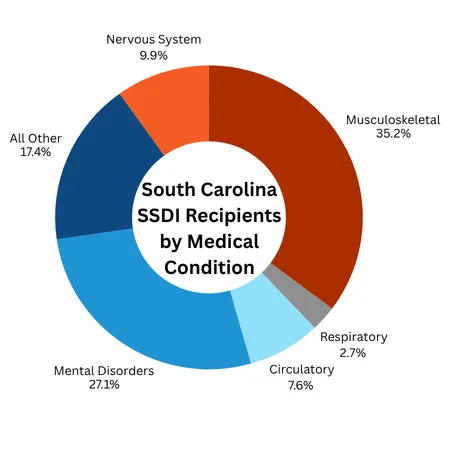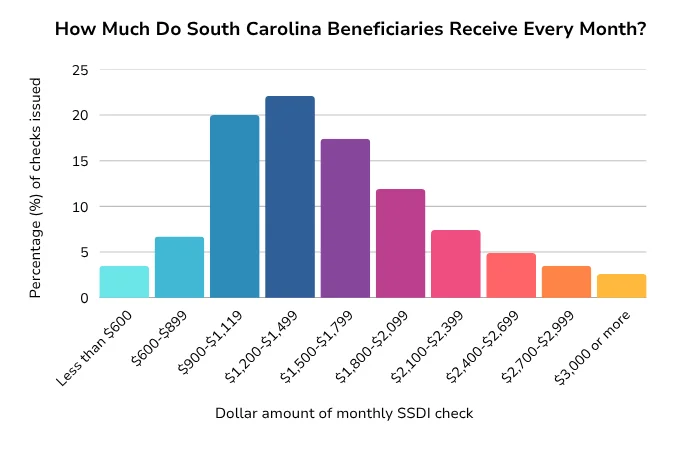Here are some great resources for South Carolina residents who are applying for Social Security disability benefits.
If you live in South Carolina and you can't work for at least a year due to a medical condition, you may be eligible for disability benefits. Social Security Disability Insurance (SSDI) and Supplemental Security Income (SSI) are the two programs designed to provide an income to those who have illnesses or injuries that make them unable to work. About 220,960 adults aged 18-64 in South Carolina receive at least one of those types of benefits.
While the regulations for SSDI and SSI are made at the federal level, each state has its own agencies that help implement Social Security rules and decide who's disabled. Knowing how your claim is handled at the state level (and beyond) can help you increase your chances of getting approved—whether it's on your first try or through several appeals—and makes it easier to manage the disability waiting game.
- How to File for Social Security Disability in South Carolina
- Who Makes Disability Determinations in South Carolina?
- What Medical Conditions Qualify for Disability in SC?
- How Do I Appeal If My Disability Claim is Denied?
- What Are My Chances of Getting Disability in South Carolina?
- How Much is Disability in SC?
- Vocational Rehabilitation Services
- Short-Term Disability in South Carolina
- How Can I Get Help with My Disability Claim?
How to File for Social Security Disability in South Carolina
Filing for disability is a fairly straightforward process. There are three different ways you can complete the application for SSDI or SSI benefits.
- You can file for benefits without leaving your home by using Social Security's online application tool. Before you start, you may first want to read our article with tips for applying online.
- You can call the national hotline at (800) 772-1213 from 8 a.m. to 7 p.m., Monday through Friday, to speak with a representative. If you're deaf or hard of hearing, you can use the TTY number at 800-325-0778.
- You can visit your local Social Security field office to complete a paper disability application. There are 17 field offices located throughout South Carolina.
For more details—including what personal information you should have on hand when you apply—check out our article on filing a disability claim with Social Security.
Who Makes Disability Determinations in South Carolina?
Once Social Security receives your application, they'll first make sure that you meet the non-medical requirements for receiving benefits. Your file is then passed on to a South Carolina Disability Determination Services (DDS) office where a claims examiner, with help from a medical consultant, will review your records and decide whether you're disabled.
There are three DDS offices in South Carolina, located in Charleston, Columbia, and Greenville. If you have questions about your claim while it's being worked on at DDS or you need to submit additional medical records, you can find the contact information for each office below.
Charleston Regional Office
P.O. Box 190029
North Charleston, SC 29419
Phone: (843) 953-0300 or (800) 868-0100
Fax: (843) 953-0338 or (866) 827-7369 for medical documents
Columbia Regional Office
P.O. Box 80
West Columbia, South Carolina 29171
Phone: (803) 896-6700 or (800) 868-9777
Fax: (800) 896-6729 or (866) 653-2523 for medical documents
Greenville Regional Office
P.O. Box 3090
Greenville, SC 29602
Phone: (864) 282-4000 or (800) 868-1950
Fax: (864) 282-4482 or (866) 868-7952 for medical documents
What Medical Conditions Qualify for Disability in SC?
Any severe impairment may qualify you for disability benefits, provided that you have enough medical evidence to show that you either meet a listing or are unable to work at any job. In South Carolina, some of the most commonly awarded impairments are mental illnesses (such as anxiety or depression), musculoskeletal conditions (like back pain), and nervous system disorders (for example, diabetic neuropathy).
The chart below illustrates the percentage of SSDI recipients in South Carolina who were found disabled based on the most commonly awarded medical conditions.

Source: Annual Statistical Report on the Social Security Disability Insurance Program, 2023
For more information, check out our article on what conditions qualify for Social Security disability benefits.
How Do I Appeal If My Disability Claim is Denied?
Most disability claimants have to take three steps before they get approved for benefits. First, you file an application. Then, if you receive a denial, you request a reconsideration of the denial. If you get denied yet again, you can ask for a hearing in front of a disability judge. The hearing stage is often your best chance of getting your claim approved.
Request Reconsideration
Approximately three to five months after you initially apply for disability benefits, you'll be notified in writing whether or not your claim has been approved. Within 60 days of receiving your denial letter, you can start your appeal by filing a "request for reconsideration." At the reconsideration stage, a different claims examiner at DDS than the one who first denied your disability claim will review your file to see if the correct decision was made.
Request a Disability Hearing
About three to four months after reconsideration review, you'll get another letter in the mail telling you if your claim is approved. If you've been denied again, the next step is to request a hearing in front of an administrative law judge (ALJ). As with the reconsideration request, you have 60 days to submit your appeal paperwork.
Once Social Security receives your hearing request, you'll be "in line" to have a disability hearing. Unfortunately, due to a large backlog of claims, you may have to wait a long time—the average wait for someone who requests a disability hearing from one of South Carolina's Offices of Hearings Operations (OHOs) is just under a year. If you want to contact the OHO handling your case about the status of your claim, you can find the addresses and phone numbers for each hearing office below.
Charleston OHO (serving the Beaufort, Charleston, Conway, Georgetown, Myrtle Beach, and Walterboro field offices)
3875 Faber Place Drive, Suite 300
North Charleston, SC 29405
Phone: (877) 405-1467
Fax: (833) 604-0730
Columbia OHO (serving the Aiken, Bennettsville, Columbia, Florence, Orangeburg, and Sumter field offices)
101 Executive Center Drive, Suite 215
Columbia, SC 29210
Phone: (866) 399-6950
Fax: (833) 710-0401
Greenville OHO (serving the Anderson, Clinton, Greenville, Greenwood, and Spartanburg field offices)
475 North Main Street
Mauldin, SC 29662
Phone: (866) 827-6721
Fax: (833) 509-0823
At your hearing, you'll be able to speak directly to the judge who will be deciding whether or not to approve your claim. The ALJ will have reviewed your file and may ask you questions about your situation. Sometimes a medical or vocational expert will call in by phone to give an opinion about topics like whether you equal a listing or have any transferable skills to other jobs.
Appeals Council and Beyond
Although in rare instances the judge will announce a decision at the hearing, you'll most likely have to wait a month or two after your disability hearing to receive a written decision in the mail. If you receive an unfavorable ALJ decision, you can ask that Social Security's Appeal Council review the decision for reversible errors. If that fails, the last step is to file a lawsuit in South Carolina's federal district court.
What Are My Chances of Getting Disability in South Carolina?
Statistically, South Carolina DDS approves about 40% of disability applications at the initial level, slightly above the national average of 38.3%. At reconsideration, this percentage dips to 15.3%, just about equal to the national average. For the fiscal year ending August 2025, judges at South Carolina OHOs issued 5,632 decisions. Out of those decisions, 3,322 were partially or fully favorable, resulting in an award rate of 59%.
How Much is Disability in SC?
Because SSDI and SSI are federal benefits, the amount you'll receive doesn't change from state to state. SSDI payments are particularly tailored to each beneficiary since they're calculated based on your individual earnings record, which can vary significantly between each person. Below is a chart showing the distribution of SSDI benefit amounts for South Carolina residents:

Source: Annual Statistical Report on the Social Security Disability Insurance Program, 2023
SSI payments are set annually by the federal government at a flat monthly rate ($967 in 2025) that's decreased if you have additional income. However, the state of South Carolina can provide supplemental payments to the SSI amount for some residents who require care in an assisted living or licensed residential care facility. Most of these supplemental payments go directly to the health care facility, but there is a small (about $100) personal needs allowance that is paid directly to the SSI recipient.
Vocational Rehabilitation Services
The South Carolina Vocational Rehab Department (SCVRD) provides services to disabled South Carolina residents who would like to try to return to work. The SCVRD offers job placement assistance, training classes, and supportive employment arrangements. In addition to their regional offices, the SCVRD also has 24 job training centers throughout the state. More information on vocational rehab in South Carolina can be found on SCVRD's website.
Short-Term Disability in South Carolina
Social Security doesn't award temporary disability benefits for medical conditions that last for less than one year. So if you're expecting to return to work within the year and you have private short-term disability coverage, you might consider filing a claim with your insurer instead of applying for SSDI or SSI. Most employer-provided short-term disability insurance will pay you a certain percentage of your average wages for a time (typically weeks or months) due to an illness or injury you incurred off the job. For more information, check out our article on preparing and filing your short-term disability claim.
How Can I Get Help with My Disability Claim?
If you've been denied Social Security benefits in South Carolina, or have questions about your current claim, you may want to consider contacting an experienced disability attorney for advice. Your chances of winning are much higher if you're represented by a lawyer who can help you strengthen your case and represent you at a hearing.
If you're worried about the cost of hiring a lawyer (as many disability claimants are), it may help to know that disability attorneys typically work on contingency, meaning they don't get paid unless and until you win your claim. Many also offer free consultations, so it doesn't hurt to ask around until you find a lawyer who's a good fit for you.
- How to File for Social Security Disability in South Carolina
- Who Makes Disability Determinations in South Carolina?
- What Medical Conditions Qualify for Disability in SC?
- How Do I Appeal If My Disability Claim is Denied?
- What Are My Chances of Getting Disability in South Carolina?
- How Much is Disability in SC?
- Vocational Rehabilitation Services
- Short-Term Disability in South Carolina
- How Can I Get Help with My Disability Claim?
